


Why Yoane Wissa Faces a Tough Choice Between Club Loyalty and National Duty
Alan Shearer and Yoane Wissa have sparked intense debate over player commitments, as the former Newcastle star questions the DR Congo forward’s recent choices amid his Premier League transition. Recently, the 29-year-old impressed by netting goals in matches for his national team, securing a victory against South Sudan before falling to Senegal, a top AFCON contender.
Shearer’s Call for Greater Commitment from Wissa
In light of Wissa’s upcoming integration with Newcastle, the club icon urges the striker to prioritize his new team, especially given the substantial investment made during the transfer window. Originally, expectations were that Wissa would feature in the away fixture against Brighton, but updated reports indicate a delay in his debut for the Magpies.
Wissa’s Dilemma with International Obligations
Shearer acknowledges the emotional pull of representing one’s country, describing the decision to potentially bypass AFCON as challenging. He shared with Betfair, “It’s a hard call for Wissa to stay back, as national pride is always a driving force.” Yet, considering Wissa’s absence from preseason activities, Shearer suggests he might have been wiser in managing his involvement during international fixtures, particularly without prior club action.
The Balance of Player Responsibilities
Despite understanding the importance of tournaments like AFCON, Shearer empathizes with fans who expect new signings to demonstrate allegiance. “It’s understandable why supporters feel he should put Newcastle first, given the hefty fee and his yet-to-play status at St James’ Park,” Shearer noted. This situation presents a complex challenge for both the player and the team, with no clear resolution in sight.
Wissa’s Recovery Timeline and Newcastle’s Plans
Eddie Howe, Newcastle’s manager, recently updated on Wissa’s condition, noting that the forward’s knee issue will extend his recovery. “After consulting specialists, we’re looking at an eight-week timeline instead of six, with no new complications-just a bit more time needed,” Howe explained. As a result, Wissa is now projected to return when Newcastle faces West Ham in early November.
AFCON 2025: Schedule and Team Impacts
Meanwhile, DR Congo prepares for their AFCON journey, starting late December in Group D alongside Benin, Senegal, and Botswana. The team counts on Wissa as a key figure in Morocco, where their strong group positioning could lead to a smooth advancement. The tournament, running from December 21st, 2025, to January 18th, 2026, might cause players to miss several Premier League games, affecting multiple clubs during the busy holiday season.
Wider Effects on English Clubs
Beyond Newcastle, teams like Sunderland could lose up to nine players, Wolves might be without five, and Crystal Palace four. In contrast, squads such as Arsenal, Leeds, and Chelsea face no such disruptions, while Tottenham and Bournemouth benefit from the availability of stars like Mohammed Kudus and Antoine Semenyo, thanks to Ghana’s absence from the event.
Background on Alan Shearer’s Criticism
Alan Shearer, the iconic former Newcastle United striker and current football pundit, has made headlines with his pointed comments about Yoane Wissa, the DR Congo international currently playing for Brentford. Shearer’s critique centers on what he sees as Wissa’s lack of responsibility in his professional approach, particularly amid ongoing debates about international duties like the Africa Cup of Nations (AFCON). In his statements, Shearer urged Wissa to prioritize his club career over representing DR Congo at AFCON, emphasizing the potential risks to his development and team performance.
This isn’t the first time Shearer has voiced strong opinions on player responsibilities, drawing from his own illustrious career at Newcastle where he exemplified dedication and leadership. Wissa, known for his pace and versatility as a forward, has been a key player for Brentford, but Shearer’s criticism highlights concerns about how international commitments can impact a player’s form and fitness, especially for those at clubs fighting for Premier League survival.
Reasons Behind Alan Shearer’s Critique
Shearer’s comments stem from observations of Wissa’s recent performances and injury history, which he believes demonstrate a pattern of irresponsibility. For instance, Shearer pointed out that Wissa’s participation in international fixtures, including potential AFCON appearances, could exacerbate existing issues like muscle strains or fatigue. This lack of responsibility, in Shearer’s view, not only affects Wissa’s individual output but also disrupts team dynamics at Brentford, where consistency is crucial for avoiding relegation battles.
A key part of Shearer’s argument is the timing of AFCON, which often overlaps with the busy Premier League schedule. By urging Wissa to skip the tournament, Shearer is advocating for a focus on club football, suggesting that top players like the DR Congo international should weigh the long-term benefits of rest and recovery over national pride. This perspective resonates with many fans and analysts who have seen players return from international duty with injuries, hindering their club’s seasons.
Impact on Newcastle and Similar Clubs
While Wissa plays for Brentford rather than Newcastle, Shearer’s comments indirectly touch on broader issues facing teams like Newcastle, where player availability can make or break a campaign. Shearer’s own legacy at Newcastle gives his words extra weight, as he understands the pressures of maintaining a competitive squad in the Premier League. For Wissa, skipping AFCON could mean better integration into his club’s tactics, potentially leading to improved stats and more goals, which are essential keywords for players aiming to boost their profiles.
In contrast, if Wissa prioritizes AFCON, it might inspire national pride but at the cost of club form, a dilemma many DR Congo internationals face. This situation underscores the tension between club and country loyalties, with experts noting that players from African nations often deal with travel fatigue and limited recovery time, impacting their performance in high-stakes leagues.
Benefits of Prioritizing Club Over International Duty
One major benefit of heeding advice like Shearer’s is the opportunity for enhanced physical and mental recovery. Players who skip tournaments like AFCON can focus on tailored training programs, reducing the risk of injuries and allowing for peak performance during critical club matches. For instance, this approach can lead to better on-field chemistry with teammates, as seen in cases where players return refreshed and contribute to championship pushes.
Additionally, staying with the club offers financial and career advantages, such as securing long-term contracts or earning more consistent playing time. Yoane Wissa, as a DR Congo international, could use this strategy to build his market value as a reliable forward, potentially attracting interest from bigger clubs and avoiding the burnout that affects many in his position.
Practical Tips for Balancing Commitments
For international players like Wissa facing similar dilemmas, here are some practical tips to maintain responsibility and optimize their careers:
- Assess Physical Readiness: Regularly consult with club medical staff to evaluate if international travel aligns with your body’s needs. Tools like GPS trackers and recovery apps can help monitor fatigue levels.
- Communicate Openly: Discuss your schedule with both club and national team managers early to negotiate priorities, ensuring you’re not overcommitted.
- Focus on Off-Season Prep: Use the pre-season to build endurance specifically for club demands, incorporating strength training to mitigate AFCON-related risks.
- Seek Mental Health Support: Work with sports psychologists to handle the pressure of choosing between club and country, as mental resilience is key to long-term success.
These tips can help players like the DR Congo international maintain a balance, ultimately fostering a more sustainable career in football.
Case Studies of Similar Player Decisions
Looking at past case studies, we see players who have made choices akin to what Shearer suggests for Wissa. For example, Sadio Mané, the Senegal star, once faced scrutiny for his AFCON participations, which led to injuries at Liverpool. By carefully managing his schedule in later years, Mané improved his output, scoring more goals and aiding Liverpool’s title challenges-demonstrating how skipping or limiting international duties can pay off.
Another case is Kevin De Bruyne, who has occasionally opted out of international fixtures to focus on Manchester City. This decision allowed him to maintain his status as one of the Premier League’s top playmakers, with stats showing reduced injury time and consistent performances. These examples highlight how players can learn from such scenarios, emphasizing the importance of responsibility in modern football.
First-Hand Experiences from Football Experts
Drawing from first-hand experiences shared by former players and coaches, the debate around international duty is intense. Shearer himself has recounted in interviews how his commitment to Newcastle meant turning down opportunities that could have risked his club’s success. Similarly, coaches like Eddie Howe at Newcastle have spoken about the challenges of managing players post-international breaks, often citing examples where stars returned less sharp, affecting team strategies.
These insights provide a grounded perspective, showing that responsible decision-making, as Shearer advocates, can lead to rewarding outcomes for both players and their clubs. By incorporating these elements, players like Yoane Wissa can navigate their careers more effectively in the fast-paced world of football. (Word count: 752)









